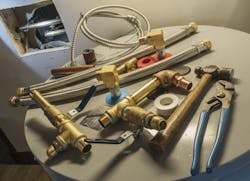When replacing a water heater, most plumbers replace what is there with something similar and never present the customer with options. Customers are ill-served by plumbers who fail to provide choices. Moreover, the plumber is likely leaving money on the table. Here are 10 options to offer on any water heater replacement
1. Tankless Water Heaters
The first option to discuss with homeowners is tankless water heaters. Tankless manufacturers have done a good job advertising the category, making this a more intriguing and acceptable option for consumers. Customers can benefit from tankless water heater if they run out of hot water during normal use and lack room for a larger water heater. Consumers may also benefit from the reduced footprint of a tankless water heater or when recent government efficiency requirements result in a replacement water heater being too large for the current closet or location. When storage water heaters are located in attic spaces, customers may prefer the reduced leakage risk of a tankless water heater.
2. Heat Pump Water Heaters
Expect more of a push from the government and utilities for heat pump or hybrid water heaters in the coming years. Heat pump water heaters pull heat from ambient air and use it to heat or pre-heat input water. For most of the country, especially the southern states, this is a good option to offer when replacing an electric water heater.
3. Solar Thermal Water Heaters
While they are the most expensive water heaters to install, solar thermal offer consumers the lowest cost hot water. A back-up heat source is required, which adds to the cost. Yet, for customers with the money who are concerned about lowering their carbon footprints, solar thermal may be the way to go. Do not decide for them. Present it as an option and let the customer decide.
4. Quick Recovery Water Heaters
Almost everyone overlooks quick recovery. In essence, this is simply a water heater with added ability to heat water fast. Explain it as the middle ground between a storage water heater and a tankless water heater. With quick recovery, it is possible to get by with a smaller tank. This is important when replacing a water heater in a tight space where the larger footprint of today’s storage water heaters will not fit.
5. Self-Cleaning Water Heater
Water heaters should be flushed annually to remove sediment build-up on the bottom. Unfortunately, few are flushed. Fortunately, water heater manufacturers offer self-cleaning water heaters that stir up the sediment, helping to prevent it from settling at the bottom. This should extend water heater life. Usually, these are the premium water heaters in a manufacturer’s line. Give people the option to buy premium and some will.
6. Mixing Valves
Keeping hot water temperature at 120 deg. F reduces the potential for scalding. This is especially important for homes with infants or the elderly. On the other hand, keeping the temperature at 140 deg. F for storage water heaters reduces the potential for salmonella and legionella. Mixing valves offer the best of both worlds, by keeping the tank temperature at 140 deg. F and delivering 120 deg. F water to the home. This should be offered as an option with every storage water heater replacement.
7. Expansion Tanks
In some areas, local code requires the use of expansion tanks. Whenever there is a closed system, an expansion tank is preferred whether code or not. It protects the home’s plumbing system from damage due to thermal expansion and/or incoming water supply pressure changes. For homeowners, it represents low-cost insurance.
8. Recirculation Pumps
Merely mentioning the possibility of instant hot water from every tap is enough to cause most homeowners to immediately sign up for a recirculation pump. To consumers, this seems like a luxury item. Recirculation pumps should be offered as an option on every water heater replacement.
9. Water Alarms
Water alarms range from low-cost audible alarms to alarms that are part of a connected home strategy. Whenever there is a storage water heater replacement, a water alarm should be included as part of the standard offering to differentiate yourself. At the very least, offer it as a separate option.
10. Automatic Shut Off Valves
Several manufacturers offer shut off valves that are paired with water alarms. These limit the damage from a leak. Some are limited to the water heater and others shut off water to the whole house. These should be an option on any storage water heater replacement, especially if the old water heater is a leaker or if the water heater is located in an area where a leak will cause substantial damage.
We have many options in the plumbing industry to offer consumers on water heater replacements. Prepare a menu of these options and watch your average ticket for water heater replacements and your gross profit grow.
Matt Michel is President of Service Nation Inc. Contractor Magazine named Matt one of the “18 Most Influential People in the History of the Plumbing and Hydronics Industries.” He can be reached at [email protected] or by mobile at 214/995-8889.
About the Author
Matt Michel
Chief Executive Officer
Matt Michel is CEO of the Service Roundtable (ServiceRoundtable.com). The Service Roundtable is an organization founded to help contractors improve their sales, marketing, operations, and profitability. The Service Nation Alliance is a part of this overall organization.
